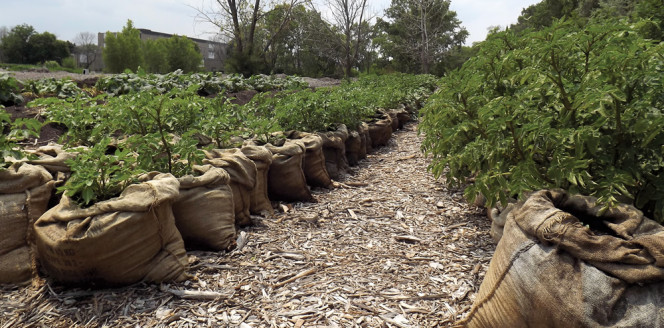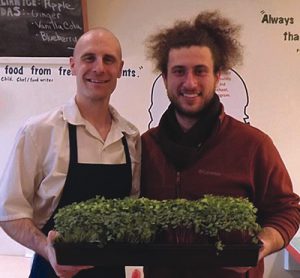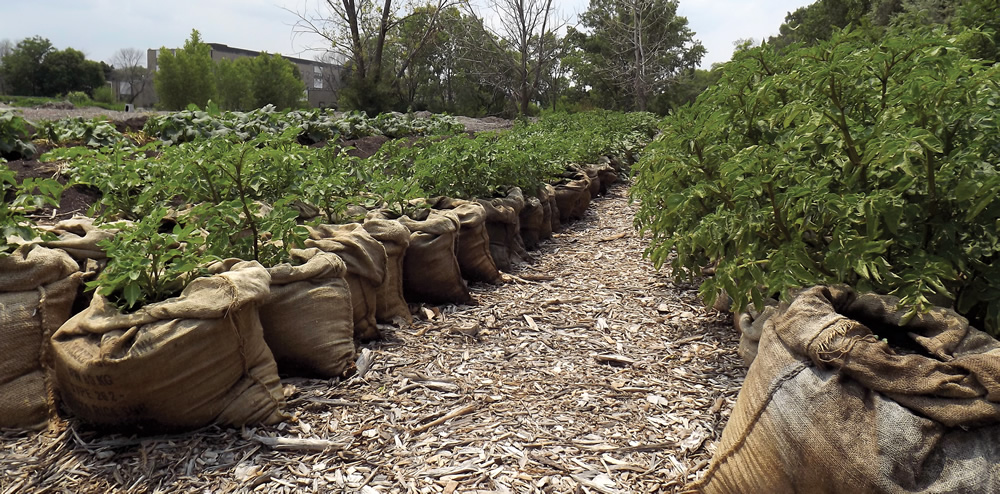Urban Canopy transformed a 2-acre junkyard in Chicago’s Englewood neighborhood into a thriving urban farm — with the help of compost.
Michelle Burwell
BioCycle March/April 2015

To create the urban farm, about 3-feet of wood chips were laid down on the parking lot and then raised beds were created using certified organic compost. A variety of potatoes grown in a “contained” raised bed to facilitate harvesting are shown.
On top of a small grassy hill, in front of the Anchor House, a subsidized apartment complex in Chicago’s Englewood neighborhood, stand three unassuming tents. Onions, various salsas, corn and other produce sit beneath the shade. It is Englewood’s very first farmer’s market. Spearheaded by Alex Poltorak, founder of Urban Canopy, an organization that searches for urban solutions to create a sustainable and equitable food system, the market stands as a flagship of sorts, to demonstrate to the local community that eating healthy is a right, not an economic or social privilege.
In 2012 Urban Canopy, with grant assistance from the Woodlawn Community Development Center in Chicago, established an urban farm behind the Anchor House. Its proximity to the farmer’s market makes it the epitome of sourcing local —both reducing cost and helping to literally demonstrate the circular economy to the surrounding community. “We’ve had people come up looking for a particular squash and there were none left,” explains Poltorak. “And I’ll say, ‘Let’s go harvest one. People are always surprised to watch as we walk around back and return with more food.”
Walking back to the urban farm, visitors are first struck by the flourishing rows of green that seem to belie the neighborhood’s status as a food desert. But just over a year and a half ago the site was nothing more than a 2-acre junkyard. Once a parking lot, it’d been filled with couches, tires and a 40-foot tall tree coming right out of one of the parking spots, all of which had to be hauled off to even begin the transformation. Today, the sliver of asphalt that creeps out around the edges of the wood chips is the only indication of what lies beneath.
Urban Canopy began developing the farm by first adding roughly three feet of wood chips on top of the parking lot and then creating raised beds from certified organic compost that was trucked to the site. “This keeps the concrete barrier on top of whatever soil, and possibly contaminents, may be below,” says Poltorak. The wood chips also create an absorbent layer that holds more water.

Justin Vrany (left), owner of Sandwich Me In, and Alex Poltorak hold the red rose radishes and daikon radishes from Urban Canopy’s RSA (Restaurant Supported Agriculture) program.
Urban Canopy and its team then began a compost club, sourcing food scraps primarily from residents of the Anchor House, as well as some local restaurants, in order to maintain and restore the soil.
Strengthening The Community
The goal is that by setting up their operation directly within eyesight, residents of the Anchor House will be able to watch, learn and practice the trade, in order to fully take over the farm in 3 to 5 years. By turning over the farm to the residents, Urban Canopy hopes to create not only local jobs, but also a local economy, keeping money circulating within the community. Residents will have a sustainable source of healthy food options just out their back door, and will no longer have to travel out of their neighborhood for groceries.
But Poltorak knows it will be a challenge. He recognizes that he’ll have to convince people that they can eat healthy for little to no increase in cost, or they’ll likely remain incredulous. So the team at Urban Canopy pays scrupulous attention to numbers and, through trial and error, work the growth patterns down to a science. “It’s about telling the stories in numbers,” he explains. “We want to measure our sustainability and what that means. We know how much water goes into each tray. How much electricity. How much we compost to tell the story and create a cost perspective.”
In addition, Urban Canopy works tirelessly in order to sustain itself. To offset some of its costs, the organization participates in several farmer’s markets around Chicago and runs an RSA (Restaurant Supported Agriculture) program by allowing restaurants to rent its beds. Urban Canopy does all the work and each restaurant owner reaps the benefits of whatever their bed produces. “And if there happens to be a gangbuster year, we’ll sell the excess for the restaurant at market price,” adds Poltorak.
Sandwich Me In, a locally sourced, zero waste sandwich shop in Lakeview, is one restaurant that participates in Urban Canopy’s RSA program (see “Chicago Restaurant Generates Zero Waste …. Literally,” July 2014). The owner, Justin Vrany, gets red rose radishes and daikon radishes delivered straight to his door from Urban Canopy. This relationship is really a prototype of the cyclical economy Poltorak hopes to catalyze in Englewood. They’ve slowly begun to close the loop between food cultivation and consumption.
Urban Canopy has continued to expand its urban farms throughout the region, with the hope of demonstrating the potential for creating sustainable food sources. It started a farm in the Bronzeville neighborhood, as well as three other community gardens. “As these near completion and are handed back off to being community-run, we plan to create more farmland in Chicago,” notes Poltorak.
Michelle Burwell is a freelance writer and journalist based in Chicago.













